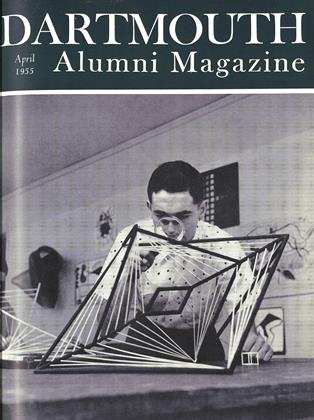THIS month I would like to give my readers something a little different. I want to give a few reading choices made by a representative number of eminent English writers. I am familiar with some but not all of the books mentioned, and believe that they are of high quality, and will please most American readers.
Lord David Cecil, author of die recent successful biography of Melbourne, chose Edwin Muir's An Autobiography, a narrative of this poet's romantic childhood in the Orkneys, his grim boyhood in Glasgow, and varied adventures in different European countries. Muir is a writer who observes vividly and imaginatively, and writes with a fine and austere distinction.
T. S. Eliot, St. Louis expatriate, chose Paul Tillich's Systematic Theology, which, he says, gives the reader a deeper understanding of the problems facing theology today, and illumines subjects apparently remote from those with which Tillich is concerned. Eliot also recommends Lord Percy's The Heresy of Democracy, and Wyndham Lewis's Self-Condemned. The only factor common to these three books is that the authors are all men of great originality of mind and independence of character.
Medical men among my readers will be interested to know that Sir Alexander Fleming chose Leonard Colebrook's biography of Almroth Wright (Heinemann), who was the greatest figure in British medical science the first quarter of this century. Wright's introduction of vaccine therapy in the early years of the century, combined with the use of blood tests to control dosage, made almost as great a stir in medical circles as have the antibiotics in the last decade.
Graham Greene, enigmatic Catholic author, recommends The Letters of W. B.Yeats, edited by Allan Wade, as a book of the greatest interest. He also enjoyed Joan Evans's John Ruskin, as well as Sir Philip Magnus's Gladstone.
The greatest of living English painters, Augustus John, was entertained by Arthur Koestler's The Invisible Writing, Zoë Oldenbourg's The Cornerstone, Walter Starkie's In Sara's Tents, and Wilson MacArthur's The Desert Watches.
Rose Macaulay speaks appreciatively of Arnold Toynbee's massive work. She admits that some may question some of his interpretations, "but throughout the book surges the distant roll of civilisations like great waves crashing on desolate shores (as they are doing today), retreating with melancholy long withdrawing roar, leaving on barren beaches a few closed shells, which shall presently open and spew their pearls to enrich the incoming tide; it is high mystical drama."
Walter de la Mare, poet extraordinary, and prose writer of genius, liked Yseult Bridges' Saint - With Red Hands, an extraordinary account of the Victorian trial of the girl Constant Kent for the murder of her small step-brother. He also enjoyed Rose Macaulay's evocation of antiquity in decline, Pleasure of Ruins, and John Hadfield's new anthology of prose and poetry, as well as pictures, called A Book of Delights.
Nancy Mitford enjoyed above all else in recent reading General de Gaulle's Memoires de Guerre, of which the first volume L'Appel, has just appeared in France. It is so beautifully written that she recommends that it be read in French if possible. It is published here as Call to Arms.
The brilliant editor of Punch, Malcolm Muggeridge, recommends John Betjeman's book of poetry, A Few Late Chrysanthemums, and Somerset Maugham's TenNovels and Their Authors, as well as a rereading of Tolstoy's Ressurrection, which led him to marvel anew at Tolstoy's sublime genius.
It is a pleasure to note that the distinguished historian G. M. Trevelyan recommends an American book, notably, Wallace Notestein's The English People onthe Eve of Colonisation, 1603-1630. He calls it a pleasant and instructive volume written primarily for Americans.
Evelyn Waugh liked Elizabeth David's Italian Food, Betjeman's book of poetry noted above, and Alan Hackney's Private'sProgress.
Vaughan Williams, noted English composer, recommends Karl Geiringer's TheBach Family, and Ivor Gurney's Poems.
I think you could trust any or all of these recommendations.
 View Full Issue
View Full Issue
More From This Issue
-
 Feature
FeatureAn Experiment in Dormitory Living
April 1955 By JOSEPH FRANKLIN MARSH '47, -
 Feature
FeatureThe 1955 Hanover Holiday Program
April 1955 By HERBERT W. HILL -
 Feature
FeatureThey're Putting the D in Debating
April 1955 By FRANK PEMBERTON -
 Feature
FeatureTurkeys for Dartmouth
April 1955 -
 Class Notes
Class Notes1918
April 1955 By ERNEST H. EARLEY, RICHARD A. HOLTON -
 Article
ArticleThe Undergraduate Chair
April 1955 By G. H. CASSELS-SMITH '55
HERBERT F. WEST '22
-
 Books
BooksIT'S EASY TO SKI
January 1937 By Herbert F. West '22 -
 Article
ArticleHanover Browsing
February 1937 By HERBERT F. WEST '22 -
 Article
ArticleHanover Browsing
May 1937 By HERBERT F. WEST '22 -
 Article
ArticleHanover Browsing
October 1952 By HERBERT F. WEST '22 -
 Books
BooksTHE HONEST RAINMAKER.
April 1953 By Herbert F. West '22 -
 Article
ArticleHanover Browsing
October 1956 By HERBERT F. WEST '22
Article
-
 Article
ArticleFEW FAILURES ANNOUNCED AFTER MID-YEAR EXAM
March, 1924 -
 Article
ArticleCHANGE IN HOUR OF MORNING CHAPEL SERVICE
APRIL, 1927 -
 Article
ArticleAlumni Club Luncheons
March 1949 -
 Article
ArticleA '26 Goes Home to Mother
FEBRUARY • 1988 -
 Article
ArticleEdward Emerson '63: "Hellbent for leather" towards Olympic gold
OCTOBER, 1908 By Harry R. Zlokower '63 -
 Article
ArticleThe Dartmouth Round Table
FEBRUARY 1929 By Leonard W. Doob '29

